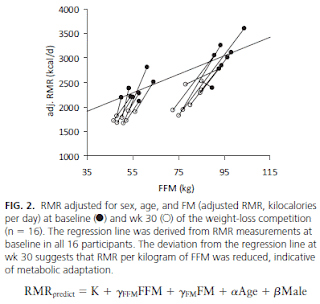I think this is a study of "Biggest Loser" participants. The measured RMR of the 11 completers fell from 2614 at baseline to 2258 at week 6 and 1763 at week 30.
Expressed per kg of fat free mass these averages become 35.5, 31.9 and 28.2 which does look like a sharp drop.
Katch-Mcardle BMR Formula:
BMR = 370 + (21.6 x Lean Body Mass(kg) ) would predict RMR of 1960, 1900 and 1720 respecively, which suggests that the slimmed down metabolic rate is what Katch & McArdle would expect but the fatter versions of the same people had a higher metabolic rate than expected because K-M don't consider fat as metabolically active.
The Mifflin-St.Jeor equation is said to be better for obese subjects, I had to make soem guesses about age and assume they were all male but this equation predicts BMR of 2380, 2330 and 1800 respectively. Again the slimmed down post-diet people have the metabolic rate the equation predicts, within 3%.
So it looks to be more like a case that these folks were "off the scale" of the prediction equations and came back onto the forecast line when the excess was shed - bear in mind they were borderline obese even at the end (BMI = 29)
The image below shows the change in adjusted metabolic rate for each participant, and the prediction based on FFM :

Nobody's RMR is below 1500 at the end so they don't appear to have dropped to an unusually slow metabolic rate.






